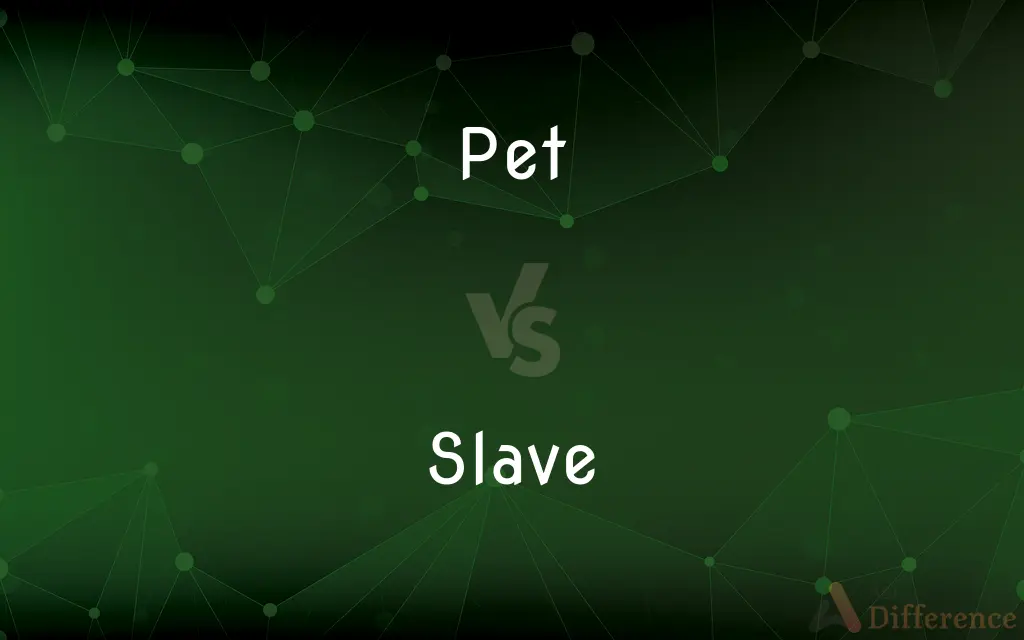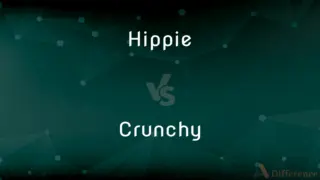Pet vs. Slave — What's the Difference?
By Urooj Arif & Fiza Rafique — Updated on March 27, 2024
A pet is an animal kept for companionship and enjoyment, while a slave is a person who is legally owned by someone else and forced to work without freedom or personal rights.

Difference Between Pet and Slave
Table of Contents
ADVERTISEMENT
Key Differences
Pets are domesticated animals kept primarily for companionship, reflecting a relationship based on care and affection. They include a wide range of animals such as dogs, cats, birds, and fish, chosen for their ability to form bonds with humans. Conversely, slavery is a historical and, unfortunately, still-present condition where individuals are owned by others, stripped of their autonomy and freedom. Slaves are compelled to work without consent, often under harsh conditions, and without any rightful compensation or the ability to make decisions for themselves.
The comparison between pets and slaves is deeply problematic and inappropriate, as it juxtaposes the consensual care of animals with the inhumane and unethical treatment of human beings under slavery. The concept of pet ownership operates within the realm of animal welfare, focusing on the humane treatment, care, and affection for animals. In contrast, slavery is a gross human rights abuse that dehumanizes and exploits individuals.
While pets are acquired for companionship and are cared for out of affection, the acquisition of slaves has historically been driven by economic motives, power, and subjugation. The care for pets includes meeting their basic needs and providing them with a safe and loving environment. On the other hand, slaves were often subjected to brutal conditions, with their basic needs barely met or entirely neglected.
It's crucial to understand the importance of respecting the dignity and rights of all individuals and to recognize the inherent differences between the ethical treatment of animals as pets and the unethical treatment of humans as property. The global consensus and legal frameworks condemn slavery and advocate for the protection of human rights, while animal welfare laws seek to ensure the humane treatment of pets.
Comparison Chart
Definition
Domesticated animal kept for companionship or pleasure.
Person legally owned by someone else, forced to work without freedom.
ADVERTISEMENT
Basis of Relationship
Consensual care and affection.
Coercion, control, and lack of personal freedom.
Legal and Ethical Status
Protected by animal welfare laws.
Recognized as a severe violation of human rights.
Purpose
Companionship, emotional support.
Economic exploitation, labor without consent.
Treatment
Cared for with the intention of mutual benefit.
Often treated poorly, with basic needs unmet.
Compare with Definitions
Pet
An animal kept for companionship.
She has a dog as a pet for emotional support.
Slave
A person forced to work under ownership by others.
Historically, slaves were used for plantation labor.
Pet
Considered part of the family.
Our cat is treated like a member of the family.
Slave
Deprived of freedom and autonomy.
Slaves had no personal rights or freedoms.
Pet
Chosen for their ability to bond with humans.
Parrots are popular pets for their social nature.
Slave
Subject to harsh conditions without consent.
Many slaves faced brutal working and living conditions.
Pet
Requires responsible care and affection.
Regular vet visits are crucial for a pet's health.
Slave
Economic exploitation drives slavery.
The slave trade was motivated by profit and exploitation.
Pet
Protected by laws ensuring humane treatment.
Animal welfare laws regulate pet care standards.
Slave
Recognized as a violation of human rights.
International laws condemn slavery as a crime against humanity.
Pet
A pet, or companion animal, is an animal kept primarily for a person's company or entertainment rather than as a working animal, livestock or a laboratory animal. Popular pets are often considered to have attractive appearances, intelligence and relatable personalities, but some pets may be taken in on an altruistic basis (such as a stray animal) and accepted by the owner regardless of these characteristics.
Slave
One who is owned as the property of someone else, especially in involuntary servitude.
Pet
A domestic or tamed animal kept for companionship or pleasure
The pony was a family pet
A pet cat
Slave
One who is subservient to or controlled by another
His boss's slave.
Pet
A fit of sulking or ill humour
Mother's in a pet
Slave
One who is subject to or controlled by a specified influence
A slave to alcohol.
A slave to an irrational fear.
Pet
Stroke or pat (an animal) affectionately
The cats came to be petted
Slave
One who works extremely hard.
Pet
An animal kept for enjoyment or companionship.
Slave
One who acts out the role of the submissive partner in a sadomasochistic relationship.
Pet
An object of the affections.
Slave
A slave ant.
Pet
A person especially loved or indulged; a favorite
The teacher's pet.
Slave
A machine or component controlled by another machine or component.
Pet
A fit of bad temper or pique.
Slave
To work very hard or doggedly; toil.
Pet
Kept as a pet
A pet cat.
Slave
To trade in or transport slaves.
Pet
Particularly cherished or indulged
A pet grandchild.
Slave
To cause a machine or component to be controlled by another machine or component.
Pet
Expressing or showing affection
A pet name.
Slave
A person who is held in servitude as the property of another person, and whose labor (and often also whose body and life) is subject to the owner's volition and control.
Pet
Being a favorite
A pet topic.
Slave
(figuratively) A drudge; one who labors or is obliged (e.g. by prior contract) to labor like a slave with limited rights, e.g. an indentured servant.
Pet
To stroke or caress gently.
Slave
(figuratively) An abject person.
Pet
To stroke or fondle amorously.
Slave
(figuratively) One who has no power of resistance (to something), one who surrenders to or is under the domination (of something).
A slave to passion, to strong drink, or to ambition
Pet
To be sulky and peevish.
Slave
A device (such as a secondary flash or hard drive) that is subject to the control of another (a master).
Pet
An animal kept as a companion.
Slave
To work as a slaver, to enslave people.
Pet
(by extension) Something kept as a companion, including inanimate objects. (pet rock, pet plant, etc.)
Slave
(intransitive) To work hard.
I was slaving all day over a hot stove.
Pet
One who is excessively loyal to a superior and receives preferential treatment.
Slave
(transitive) To place a device under the control of another.
To slave a hard disk
Pet
Any person or animal especially cherished and indulged; a darling.
Slave
See Slav.
Pet
A fit of petulance, a sulk, arising from the impression that one has been offended or slighted.
Slave
A person who is held in bondage to another; one who is wholly subject to the will of another; one who is held as a chattel; one who has no freedom of action, but whose person and services are wholly under the control of another.
Art thou our slave,Our captive, at the public mill our drudge?
Pet
Abbreviation of petition
Slave
One who has lost the power of resistance; one who surrenders himself to any power whatever; as, a slave to passion, to lust, to strong drink, to ambition.
Pet
A term of endearment usually applied to women and children.
Slave
A drudge; one who labors like a slave.
Pet
(transitive) To stroke or fondle (an animal).
Slave
An abject person; a wretch.
Pet
To stroke or fondle (another person) amorously.
Slave
To drudge; to toil; to labor as a slave.
Pet
To treat as a pet; to fondle; to indulge.
His daughter was petted and spoiled.
Slave
To enslave.
Pet
To be a pet.
Slave
A person who is owned by someone
Pet
To be peevish; to sulk.
Slave
Someone who works as hard as a slave
Pet
Favourite; cherished; the focus of one's (usually positive) attention.
A pet child
The professor seemed offended by the criticism of her pet theory.
Slave
Someone entirely dominated by some influence or person;
A slave to fashion
A slave to cocaine
His mother was his abject slave
Pet
Kept or treated as a pet.
Pet rock
Slave
Work very hard, like a slave
Pet
A cade lamb; a lamb brought up by hand.
Slave
Held in servitude;
He was born of slave parents
Pet
Any person especially cherished and indulged; a fondling; a darling; often, a favorite child.
The love of cronies, pets, and favorites.
Pet
A slight fit of peevishness or fretfulness.
Pet
Any animal kept as a companion, usually in or around one's home, typically domesticated and cared for attentively and often affectionately. Distinguished from animals raised for food or to perform useful tasks, as a draft animal.
Pet
Petted; indulged; admired; cherished; as, a pet child; a pet lamb; a pet theory; a pet animal.
Some young lady's pet curate.
Pet
To treat as a pet; to fondle; to indulge; as, she was petted and spoiled.
Pet
To be a pet.
Pet
A domesticated animal kept for companionship or amusement
Pet
A special loved one
Pet
A fit of petulance or sulkiness (especially at what is felt to be a slight)
Pet
Using a computerized radiographic technique to examine the metabolic activity in various tissues (especially in the brain)
Pet
Stroke or caress gently;
Pet the lamb
Pet
Stroke or caress in an erotic manner, as during lovemaking
Pet
Preferred above all others and treated with partiality;
The favored child
Common Curiosities
What was the historical purpose of slavery?
Primarily economic exploitation and subjugation, using forced labor for benefit without compensation.
How do societies combat the legacy of slavery?
Through education, reparations, and promoting equality and human rights for all.
How is slavery addressed in modern times?
Through international laws, treaties, and efforts to eradicate forced labor and human trafficking.
What impact did slavery have on societies?
Deep socio-economic disparities, racial discrimination, and long-term psychological effects.
Can pets have legal rights?
Yes, many countries have laws that protect animals from cruelty and ensure their welfare.
What are the ethical considerations in keeping pets?
Ensuring their well-being, providing adequate care, and respecting their needs and nature.
Is pet ownership similar to having a slave?
No, pet ownership is based on care and companionship, while slavery is an inhumane deprivation of freedom.
What responsibilities do pet owners have?
Providing food, shelter, medical care, and emotional support.
How do animal rights differ from human rights?
Animal rights focus on humane treatment and welfare, while human rights encompass a broad range of freedoms and protections.
Why is it important to differentiate between pets and slaves?
To understand and respect the gravity of human rights abuses inherent in slavery and the ethical care involved in pet ownership.
Share Your Discovery

Previous Comparison
Hippie vs. Crunchy
Next Comparison
Tin vs. ZincAuthor Spotlight
Written by
Urooj ArifUrooj is a skilled content writer at Ask Difference, known for her exceptional ability to simplify complex topics into engaging and informative content. With a passion for research and a flair for clear, concise writing, she consistently delivers articles that resonate with our diverse audience.
Co-written by
Fiza RafiqueFiza Rafique is a skilled content writer at AskDifference.com, where she meticulously refines and enhances written pieces. Drawing from her vast editorial expertise, Fiza ensures clarity, accuracy, and precision in every article. Passionate about language, she continually seeks to elevate the quality of content for readers worldwide.
















































